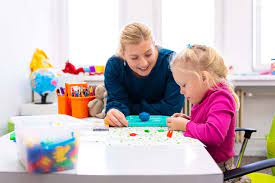Introduction
The area of child psychology is an evolving and multi-faceted one and provides valuable insights into child behaviour that can be applied to real-life situations. If you work with children, this course can enhance your personal development or be used as a foundation for further study and/or qualifications. It can also be used as a stepping stone for those after a career change or keen to enter the childcare sector.
The Certificate of Child Psychology is an online program where you will examine and understand normal patterns of childhood growth and how they are applied to certain development areas.
In this professional development course, you will learn about children’s cognitive, emotional, moral, sexual and language development; and study theories from experts including Freud, Piaget and Bowlby.
You will also study the area of socialisation in children, including the development of empathy, self-awareness and perspective, and how family structures, peers and educational settings can be of influence.

On completion of this course, you will have a thorough understanding of how children develop psychologically as they mature, and what factors influence their behaviour and thinking. This will give you valuable insights into why children of different ages behave the way they do and how you might expect them to behave!
Mode of Learning
Online and oncampus programs
Study hours
The estimated study hours are 50.
Assessment
Assessment will be comprised of written exercises, including short-answer questions, reflective tasks, short reports and/or projects. There are no examinations or due dates for assessment. As a result, you can complete training in your own time and at your own pace with the assistance of unlimited tutor support.
Course Modules
Unit 1 – Introduction to child psychology
- Levels of development: nature or nurture, isolating hereditary characteristics
- Cause versus correlation
- Continuity versus discontinuity
- Cross sectional and longitudinal studies
- Reliability of verbal reports
Unit 2 -The newborn infant
- Theories of newborn psychology
- Temperament – nature or nurture
- Parental influences
- The perinatal environment
- Parental experiences
- Fathers involvement
- Emotional disturbances during pregnancy
Unit 3 – States and senses of the infant
- Sensory discrimination (sound, smell and visual)
- Infant states (sleep, inactivity, waking, crying)
- Habituation
- Crying
- Soothing a distressed baby
- Depth perception
- Oral sensitivity
Unit 4 – Learning
- How children learn
- Habituation
- Vicarious learning
- Classical conditioning
- Operant conditioning
- Reinforcement
- Consequences and timing
- Punishment problems
- Learning control
Unit 5 – Emotions and socialisation
- Emotions in early childhood
- Origins of smiling
- Fear
- Emotional attachment
- Freudian approach
- Bowlby’s approach
- Harlow’s approach
- Responding to babies
- Role of cognition in attachment formation
- Day care
Unit 6 – Cognitive Development
- Piaget’s theory and cognitive structural development
- The importance of play
- Implications of Piaget’s theories
- Cognitive processing theory
- Memory capacity
- Memory improvement strategies
- Attentional capacity
Unit 7 – Language Development
- Is language ability learned or innate?
- Social learning approach
- Hypothesis testing approach
- How speech develops
- Helping babies talk
- One to two years
- From age 3
- Why things sometimes go wrong
Unit 8 – Intelligence
- Interaction of nature and nurture
- The nature of intelligence
- Measuring intelligence
- Parental influences on intelligence
- Testing intelligence as a tool
Unit 9 – Socialisation … Part A
- Social cognition
- self-awareness
- awareness of others
- Empathy
- Taking turns
- Having a point of view/perspective
- Social scripts
- Pretend play
Unit 10 – Morality
- Freud’s approach to moral development
- Piaget’s approach
- Kohlberg’s approach
- Pre-conventional level
- Conventional level
- Post conventional level
- Raising morally mature children
- Pro-social or altruistic behaviour
- Aggressive behaviour
- Age-related changes in aggression
Unit 11 – Sexuality
- Freud’s psychosexual stages of development
- Gender and role identity
- Sexual behaviour
- Child abuse
- Stranger abusers
Unit 12 – Socialisation … Part B
- Family influence
- Discipline
- Family structures
- Sibling influence
- School influence
- Praise
- Peer influence
- Acceptance and rejection
